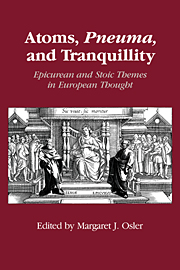Book contents
- Frontmatter
- Contents
- List of contributors
- Acknowledgments
- Introduction
- 1 Ethics and logic in Stoicism
- 2 Medieval connectives, Hellenistic connections: the strange case of propositional logic
- 3 Stoic psychotherapy in the Middle Ages and Renaissance: Petrarch's De remediis
- 4 Alonso de Cartagena and John Calvin as interpreters of Seneca's De clementia
- 5 The Epicurean in Lorenzo Valla's On Pleasure
- 6 Seneca's role in popularizing Epicurus in the sixteenth century
- 7 Stoic contributions to early modern science
- 8 Fortune, fate, and divination: Gassendi's voluntarist theology and the baptism of Epicureanism
- 9 Epicureanism and the creation of a privatist ethic in early seventeenth-century France
- 10 Robert Boyle on Epicurean atheism and atomism
- 11 Stoic and Epicurean doctrines in Newton's system of the world
- 12 Locke, Willis, and the seventeenth-century Epicurean soul
- 13 The Epicurean new way of ideas: Gassendi, Locke, and Berkeley
- 14 The Stoic legacy in the early Scottish Enlightenment
- Index
2 - Medieval connectives, Hellenistic connections: the strange case of propositional logic
Published online by Cambridge University Press: 13 November 2009
- Frontmatter
- Contents
- List of contributors
- Acknowledgments
- Introduction
- 1 Ethics and logic in Stoicism
- 2 Medieval connectives, Hellenistic connections: the strange case of propositional logic
- 3 Stoic psychotherapy in the Middle Ages and Renaissance: Petrarch's De remediis
- 4 Alonso de Cartagena and John Calvin as interpreters of Seneca's De clementia
- 5 The Epicurean in Lorenzo Valla's On Pleasure
- 6 Seneca's role in popularizing Epicurus in the sixteenth century
- 7 Stoic contributions to early modern science
- 8 Fortune, fate, and divination: Gassendi's voluntarist theology and the baptism of Epicureanism
- 9 Epicureanism and the creation of a privatist ethic in early seventeenth-century France
- 10 Robert Boyle on Epicurean atheism and atomism
- 11 Stoic and Epicurean doctrines in Newton's system of the world
- 12 Locke, Willis, and the seventeenth-century Epicurean soul
- 13 The Epicurean new way of ideas: Gassendi, Locke, and Berkeley
- 14 The Stoic legacy in the early Scottish Enlightenment
- Index
Summary
One of the more striking differences between medieval and early modern philosophy is the status accorded the study of the theory of valid arguments. The study of this theory dominated the first two years of a medieval arts curriculum, and its influence permeated university life in the Middle Ages. There is nothing shocking about a medieval theologian who is discussing predestination or the creation of the world in time stopping his argument to spend a folio or two outlining some part of a logical system which he intends to use in resolving the question. It is partly this inter-penetration of logic and substantive philosophical discussion which makes much medieval philosophy seem so familiar to someone brought up in the twentieth-century Anglo-American tradition.
Within early modern philosophy the attitude is very different, an attitude exemplified by Descartes's discussion of the role of deduction in his Regulae:
Let us now review all the actions of the intellect by means of which we are able to arrive at a knowledge of things with no fear of being mistaken. We recognize only two: Intuition and deduction.
By intuition I … mean … the conception of a clear and attentive mind which is so easy and distinct that there can be no room for doubt about what we are understanding. Alternatively, and this comes to the same thing, intuition is the indubitable conception of a clear and attentive mind which proceeds solely from the light of reason. Because it is simpler it is more certain than deduction, though deduction, as we noted above, is not something a man can perform wrongly.
- Type
- Chapter
- Information
- Atoms, Pneuma, and TranquillityEpicurean and Stoic Themes in European Thought, pp. 25 - 38Publisher: Cambridge University PressPrint publication year: 1991
- 1
- Cited by



